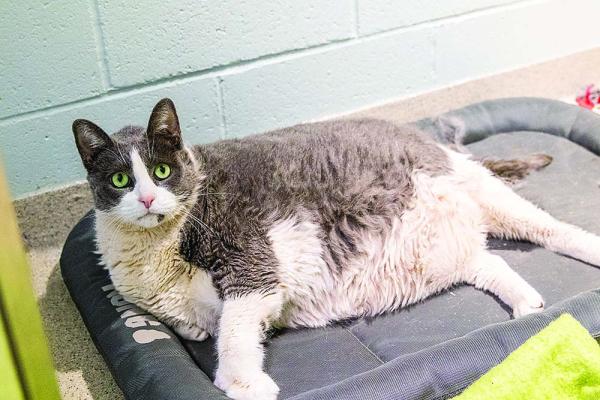November 23, 2021

KC, a 10-year-old car who came to the Animal Rescue League weighing over 30 pounds, was able drop pounds, get healthy, and was recently adopted into a new home. ARL Boston photo
If you’re like me, you love the look on your pet’s face when you give them a treat. It’s a reward for good behavior or for just being a loving companion. But a few treats here and there can turn into over-feeding, and is just one factor that can lead to significant weight gain for our pets.
November is National Pet Obesity Awareness Month and, at the Animal Rescue League of Boston (ARL), we have seen a marked increase in the number of animals in our care battling obesity. In fact, it’s a growing problem nationally. Survey data released in 2018 revealed that 55 percent of dogs and 60 percent of cats in the US are classified as overweight or obese.
Consider that for a moment. According to pet population estimates from 2018, 50 million dogs and 56 million cats are considered overweight or obese!
Obesity can cause a myriad of issues for our pets. Diabetes in cats, insulin resistance in dogs, hypertension, arthritis, skin issues, certain cancers, and other problems are increased when our pets are overweight.
But, with a combination of exercise and proper diet, your pet can get back to a healthy, normal weight. Recently I witnessed the transformation of a 10-year-old cat named KC, who came to ARL weighing over 30 pounds! It took several months, but with persistence and encouragement, KC was able to lose weight, get healthy, and was recently adopted into a loving home.
Here are 5 tips to help keep your pet trim and fit.
• Designated Mealtimes vs. Free Feeding. Free feeding lends itself to continuous grazing throughout the day, which can lead to weight gain. Instead, have set meal times for your pet. This gives our pets structure and routine that are essential both for them and for us!
• Keep Treats in Check. Treats are exactly that – treats! Treats are rewards, so be sure to use them sparingly and only when they’re deserved.
• Maintain a Balanced Diet. Try not to give your pet food from your plate, as many foods we consume are processed, fried, or contain additives. This can not only lead to weight gain, but also upset your pet’s stomach. It can also encourage begging behavior. Tailor your pet’s diet based on their age, breed, and activity level to ensure they’re getting the proper nutrition.
• Make Regular Vet Visits. Just like regular doctor visits for us, your pet also needs regular visits to the veterinarian to make sure they’re happy, healthy, and maintaining a proper weight. If your pet is overweight, your veterinarian can advise you on a feeding plan and recommend pet food formulas to aid in weight loss.
• Get Moving! Playtime and exercise are not only key to maintain a healthy weight, but also keep our pets mentally sharp as well.
Bottom line, if your pet could stand to lose a few pounds, it’s best to act now. It’s a slow and steady process that takes time, but if you take steps now to help your pet trim down, they will thank you later!
Dr. Edward Schettino is the president and CEO of the Animal Rescue League of Boston, and has a doctorate in Veterinary Medicine from the Cummings School of Veterinary Medicine at Tufts University. Pet questions? Email ARL at press@arlboston.org.



